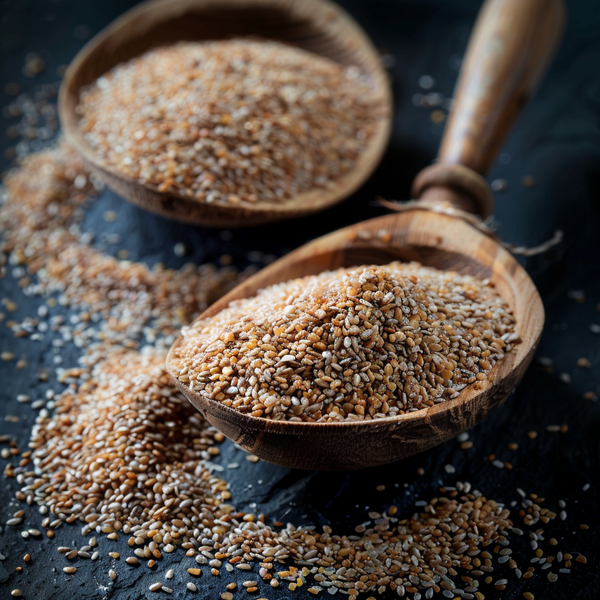
Psyllium seeds
Psyllium seed, specifically the husks derived from the seeds of the Plantago ovata plant, is renowned for its high fiber content and is widely used as a dietary supplement. However, psyllium husk also has various culinary uses, mainly due to its ability to absorb water and form a gel-like consistency. Here’s how psyllium husk is commonly used in cooking:
Gluten-Free Baking: Psyllium husk is a popular ingredient in gluten-free baking. It acts as a binding agent, replacing the gluten in flours like wheat, which typically gives dough its elasticity and structure. Adding psyllium husk to gluten-free breads, cakes, and pastries helps improve their texture and moisture retention.
Vegan Baking: In vegan recipes, psyllium husk can serve as an egg substitute. When mixed with water, it forms a gel that can help bind ingredients together, much like an egg would in traditional baking.
Thickening Agent: Psyllium husk is an effective thickener for soups, sauces, and gravies. It absorbs liquid and expands, helping to thicken these dishes without altering their flavor.
Smoothies and Beverages: Adding a small amount of psyllium husk to smoothies or shakes can increase their fiber content and create a thicker, more satisfying texture.
Homemade Snack Bars: In recipes for homemade energy bars or no-bake snack bars, psyllium husk can help to bind the ingredients and provide structure, preventing the bars from falling apart.
Low-Carb Cooking: For those following low-carb or ketogenic diets, psyllium husk is useful in baking and cooking as it adds bulk and fiber without adding net carbohydrates.
Bread and Pizza Dough: Adding psyllium husk to dough recipes can improve the texture and moisture content of the final product. It's particularly useful in whole grain breads or doughs that might otherwise be dense and heavy.
When using psyllium husk in cooking, it's important to remember that it absorbs a significant amount of liquid, so additional water or other liquid may need to be added to recipes to compensate. Additionally, because psyllium husk expands considerably upon absorbing water, it's essential to consume it with ample fluid to aid digestion and prevent gastrointestinal discomfort.
Due to its excellent water-binding capabilities, psyllium husk is a valuable ingredient for improving the texture and nutritional profile of many dishes, particularly in specialized diets.
Nutritional Information
calories
200
carbohydrates
77.3 g
fats
0.5 g
protein
4.6 g